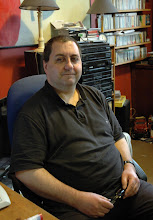This week’s edition of “In Touch” – a programme for blind and visually impaired listeners on BBC Radio 4 brings two pieces of exciting news. First of all, a talking measuring jug, which announces in stentorian tones - although at least with an English accent - the volume of liquid it has measured: for example, 250ml of water. This should prove a boon for those of us who like to experiment in the kitchen and where simply sloshing liquids in has produced unpredictable results. However, I am not sure if this will be good news or not for the various friends who may be forced to consume my burnt offerings!!
The second piece of news is about very early stages of research into using stem cells to regenerate the optic nerve and retinal cells damaged by glaucoma. Early trials on rats, linked with current much more advanced research into spinal cord regeneration, have shown some excitingly positive results. Stem cells injected directly into damaged optic nerve tissue have resulted in some regeneration of sight. But as the research involves mammals in the rodent class - rather than primates or human beings - it looks as though it will be several years before anything positive can be offered - even in the form of a trail for human beings.
Following the glorious ascent to the Presidency of Barack Obama, hearing this news of a rapid explosion in stem cell research that is now going to take place in the USA gives me some cause for hope and joy.
However… how do I argue the case for experimentation on higher mammals - having always been one of the soft liberal types, who in general has always been opposed to experimentation of any kind on animals? It certainly presents all sorts of moral conundrums when a treatment is potentially on offer. It’s somewhat easier to deal with the concept of experimentation on rats than it is on primates, with primates being much closer to us anthromorphically. If the only way to progress scientific and medical research involves very limited clinical and humane research on humankind’s closest neighbors before experimenting with consenting humans, then I guess it has to be so. That moral maze about whether restoration of sight can justify experimentation on higher mammals is one that I suspect will perplex me for time to come.
I have far less of a problem with the use of human stem cells harvested from unborn fetuses. Anyone with even a basic knowledge of reproductive biology will know that at fertilization more eggs are fertilized than is necessary. It makes complete sense with the skills and knowledge with which God has blessed us to make use of this resource - rather than it being simply washed away in menstruation. At the risk of trampling where angels fear to tread - in the realms of theology - I cannot believe that a loving creator, God, would wish us to do anything other than explore new ways of dealing with human suffering and loss and to exploit by-products of reproduction, which yes, would have the potential for life - but in practice would normally disappear!
 Today I find myself moved in different ways by music. At lunchtime I attended a recital, at one of the City of London churches, given by an old friend of mine who fancies himself as a singer. And thus I sat for some 45 minutes on one of the hardest and most uncomfortable benches my bottom has experienced, whist a programme of obscure lieder was delivered. I clapped enthusiastically at the end, and praised effusively the artistry of my friend, comparing him to Peter Pears and Robert Tear (some, especially those who know me, might consider this rather damning praise!), before bidding fond farewells with much continental-style kissing.
Today I find myself moved in different ways by music. At lunchtime I attended a recital, at one of the City of London churches, given by an old friend of mine who fancies himself as a singer. And thus I sat for some 45 minutes on one of the hardest and most uncomfortable benches my bottom has experienced, whist a programme of obscure lieder was delivered. I clapped enthusiastically at the end, and praised effusively the artistry of my friend, comparing him to Peter Pears and Robert Tear (some, especially those who know me, might consider this rather damning praise!), before bidding fond farewells with much continental-style kissing.Later in the afternoon, I find myself moved to tears whilst listening to Radio 3’s broadcast of Choral Evensong from Truro Cathedral - where the sumptuous excellence of the singing soars unexpectedly given the remote location. My own memories as a singer are heightened by the powerful beauty of Howells’s Collegium Regale setting, and Jonathan Dove’s Seek Him That Made the Seven Stars, both of which are favourite pieces of 20th century repertoire. I think wistfully of the joys that being a professional singer used to bring and the atmospheric feeling of the Cathedral Close … and quickly switch to other thoughts before starting to mourn lost skills and abilities and the ease of lapsing into languid dolorousness. Radio 4’s PM programme soon brings me back to reality, reminding me of the economic gloom hanging over the country!

No comments:
Post a Comment